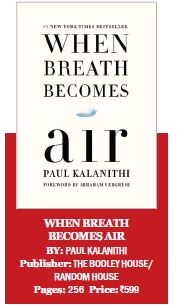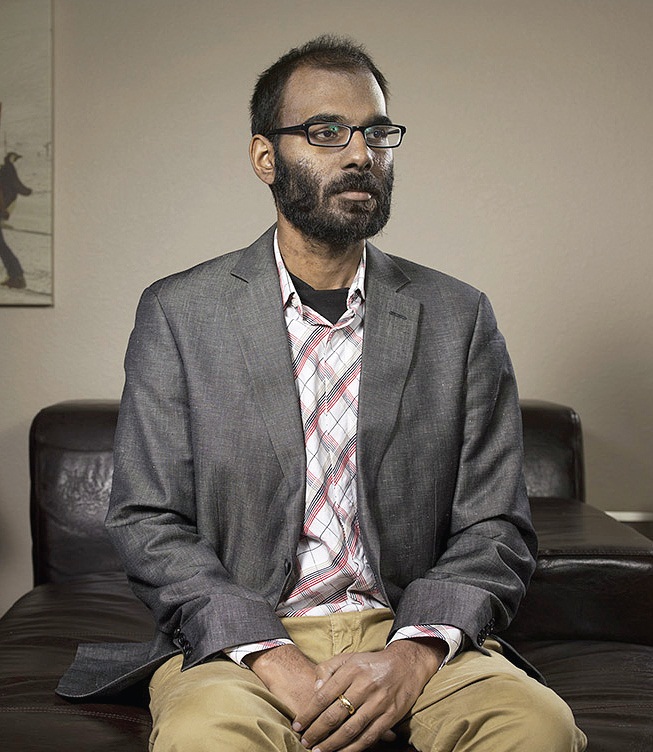 This disturbing book, which almost wrings the life breath out of you, is this year’s best non-fiction so far. Searing, unapologetically noire, inhabiting the cusp of life and death, second generation American doctor Paul Kalanithi’s account of his young life and his progress towards death takes us to the brink of our own lives. Writing till a few weeks before he died of lung cancer, with the concluding description of the days leading to this death written by his wife Lucy, it is a story of life, death, science, the meaning of life, and the various existential queries it throws up as we traipse through life as if we are born not to die.
This disturbing book, which almost wrings the life breath out of you, is this year’s best non-fiction so far. Searing, unapologetically noire, inhabiting the cusp of life and death, second generation American doctor Paul Kalanithi’s account of his young life and his progress towards death takes us to the brink of our own lives. Writing till a few weeks before he died of lung cancer, with the concluding description of the days leading to this death written by his wife Lucy, it is a story of life, death, science, the meaning of life, and the various existential queries it throws up as we traipse through life as if we are born not to die.

Kalanithi was the brightest young neurosurgeon that the US medical system produced in recent years. Wooed by all universities, offered jobs that anyone would, well, die for, Kalanithi was consumed by lung cancer despite the best medical treatment available and despite the fact that the victim himself knew how to keep away death.
Kalanithi was the third son of a Tamil Christian father and his Hindu wife who eloped to get married. In the US, his father became a well-known surgeon. After New York, his father moved the family to the far outreaches of Arizona where “spaces stretched on, then fell away into the distance”.
Out of there emerged this brilliant writer-doctor on who the US medical system too had pinned great hopes. But science hadn’t accounted for nature’s dark humour.
In When Breath Becomes Air, the young surgeon deals deeply with issues which confront all of us. First was his passion for literature and philosophy, and he imbibed the larger glories of Eliot, Whitman etc. He found Eliot’s metaphors “leaking into his own language”. And then “throughout college, my monastic, scholarly study of human meaning would conflict with my urge to forge and strengthen the human relationships that formed that meaning”. Kalanithi resolved his inner conflict by finally choosing medical science where the “moral mission of medicine” lent his med school days a “severe gravity”. Here he explored the relationship between the meaning of life and death.
In his short life Kalanithi achieved greatness in both showing an academic life few can surpass—MA in English literature and BA in human biology from Stanford, MPhil in history and philosophy of science and medicine from Cambridge, graduated cum laude from Yale School of Medicine, inducted into the Alpha Omega Alpha National Medical Honour Society, postdoctoral fellowship in neuroscience and the American Academy of Neurological surgery’s highest award for research. He was just 36.
In his death, two of his greatest passions converge—medicine and literature. Even as he groped, incised, cauterised, sutured and brought people back from the jaws of death, he himself was being eaten away by cancer. Often there was hope that the first defence against his lung cancer, Tarceva, “that little white pill” would do the trick. For six months, it seemed the cancer was in retreat. Kalanithi started work, fighting against tiredness and nausea. Then in one of the routing scans appeared a moon-shaped tumour. He couldn’t avoid chemo any longer. He fell back on literature during this difficult phase looking for meanings of death and life. “Everywhere I turned, the shadows of death obscured the meaning of any action.”
This young doctor on the threshold of death fought bravely. But there is little science can do about determined nature. Detaching himself brilliantly from impending death, Kalanithi takes us through his final weeks of turmoil. Most tearful is the last operation he would ever do as he decides to give up surgery, and go home and wait for death. He watches the soap suds drip off his hands after his last surgery. He saved one more life but his was nearing the end.